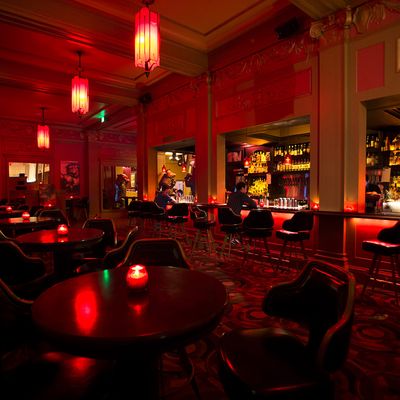
When the news came down last Wednesday that Alamo Drafthouse — the Texas-based dine-in-theater chain beloved by cineasts for its boisterous screenings and boozy milkshakes — was filing for bankruptcy and permanently closing several locations, Movie Twitter lit up with undisguised paroxysms of grief.
Alamo framed its entry into Chapter 11 proceedings as part of a “sale of substantially all its assets” to Altamont Capital Partners and Fortress Investment Group, a previous investor and a new backer of the company, respectively. Moreover, the shuttering of underperforming locations (in Kansas City, Missouri; New Braunfels, Texas; and downtown Austin, Texas) were presented as necessary evils to survive the N95 era that has starved the exhibition community of new releases, crippled moviegoing, and brought the nation’s biggest theater chain, AMC, to the brink of insolvency. “We’re extremely confident that by the end of 2021, the cinema industry — and our theaters specifically — will be thriving,” Alamo’s founder, Tim League, said in a statement.
But with three-quarters of the chain’s locations still on indefinite pandemic-mandated hiatus, such reassurances have done little to stanch the anguish among the Drafthouse faithful that their favorite mom-and-pop chain, which began as a single-screen repertory theater before growing into a nationwide 40-something-location franchise renowned for its “Rowdy” screenings, movie-themed cocktails, and costumed crowds (essentially for bringing premium feels to a night at the movies), would not be junked for financial parts and dismantled.
According to Alamo Drafthouse executives contacted by Vulture, however, the theater closures, financial restructuring under Chapter 11, and eventual sell-off are actually the best things that could have happened under the circumstances (Chapter 7 bankruptcy being the more scorched-earth variety that involves erasing debt through surrendering one’s assets). While aware of the doom-and-gloom optics the B-word can present on a Twitter timeline, they are optimistic about an imminent return to normalized theater operations as anti-gathering measures lift across the country.
“A lot of people read the headline that said bankruptcy and said ‘Oh my God!’ I got texts all day that said ‘I’m so sorry,’” says one Alamo exec who, like everyone quoted in this article, spoke anonymously because they were not authorized to publicly comment on the matter. “The whole internet is like, This is so depressing. And we’re like, Wait, this will actually allow the company to exist. People can start to be rehired, and theaters will start to reopen, hopefully soon.”
To hear it from a former Alamo executive, the theaters that have been closed (including the company’s original flagship location, the Ritz, in Austin) were already hanging on by a financial thread, even before the onset of the novel coronavirus. Further, their closure should not necessarily be read as an augury of continuing franchise attrition. “Ritz closing is a super bummer, but honestly [it] had been financially in trouble even pre-COVID,” this person says in an email to Vulture. “KC should have been closed years ago, but they wanted to project the image of growth and expansion, not closing down underperforming theaters.”
The venture-capital firm Altamont took a noncontrolling interest in Alamo in 2018 as part of an ambitious effort to expand the chain’s national footprint. In an early morning all-hands Zoom meeting about the bankruptcy announcement on March 3, League — who is also part of the lender group buying Alamo’s assets — reassured the company’s rank and file that the equity investors would not maneuver to strong-arm Alamo’s creative decision-making or tamper with the offerings that have made the chain so cultishly popular with fans. “Altamont’s always been involved, and it sounds like they love Drafthouse and have no interest in changing anything about it,” an Alamo executive says. “Tim was really excited that somebody came in who wanted to help and has no interest in being like, ‘You must do as I say.’ I think that’s the reason we all are feeling so positive about it.”
Thanks to the company’s unusually inclusive, folksy corporate culture — and, in particular, League’s expressed enthusiasm for maintaining and protecting the Alamo brand — the executives say they are not worried their optimism has been misplaced. (A company spokesman said League was not available to comment for this article.) And they say that reports of Alamo Drafthouse’s death are greatly exaggerated. “It was so funny seeing people’s swan songs,” another Alamo executive says. “We’re like, We’re still here. We’re going to work every day. We swear!”


